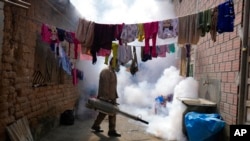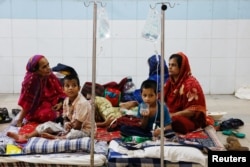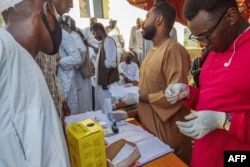The World Health Organization says dengue, a mosquito-borne illness, is surging worldwide because of climate change, along with social, environmental and other factors, such as population growth and the globalization of travel, which facilitates the spread of the viral infection.
"Climate change has an impact on transmission because it increases rainfall, humidity, and temperatures," said Diana Rojas Alvarez, World Health Organization team lead on arboviruses.
"So, these mosquitos are very sensitive to temperature, and temperature regulates how fast they grow and how fast they incubate the virus inside them," she said.
Data released Friday by the WHO documents a 10-fold increase in the incidence of dengue over the past two decades, from 500,000 cases in 2000 to 5.2 million in 2019.
The U.N. health agency says ongoing transmission of the infection combined with an unexpected spike in dengue cases this year have "resulted in close to a historic high of over five million cases and more than 5,000 dengue-related deaths in over 80 countries and territories."
The WHO warns the spike in dengue infections poses a substantial public health challenge because nearly half of the world's population, about 4 billion people, is at risk of becoming infected.
Considering those factors, Rojas Alvarez said the "WHO assessed the risk of dengue as high globally, which requires a maximal attention and response from all the levels of the organization."
Dengue is the most common viral infection transmitted to humans through the bite of infected mosquitoes and is mostly found in urban areas within tropical and sub-tropical climates.
Most people who get dengue will not have symptoms. But for those who do, the most common symptoms are high fever, headache, body aches, nausea, and rash. Most people will recover in one to two weeks. Since there is no specific treatment for dengue, the WHO says early detection and access to proper medical care will lower the probability of severe illness and death.
So far this year, the WHO says nearly 80 percent of dengue cases, or 4.1 million, have been reported in the Americas, followed by Southeast Asia and the Western Pacific.
Rojas Alvarez notes the distribution of mosquitoes has changed in the last few years due to environmental factors, climate change and, in 2023, the El Nino phenomenon.
"This has resulted in increased detection of dengue in previously dengue-free countries such as France, Italy, and Spain," she said, adding that the transmission of the virus through travel also is posing a greater risk to previously dengue-free populations.
"The ones who carry the virus around are humans because mosquitoes do not fly more than 200 meters around the house or where they hatch the eggs," she said.
"It is also concerning that dengue outbreaks are occurring in fragile and conflict-affected countries of the Eastern Mediterranean WHO region, such as Afghanistan, Pakistan, Sudan, Somalia, and Yemen.
"These countries are facing simultaneously outbreaks of infectious diseases, mass population movements, poor water and sanitation infrastructure, and recurring natural disasters," she said.
The WHO says Africa is among the top four regions most affected by arboviral diseases, including yellow fever, dengue, Rift Valley fever, and Zika. In 2023, nearly 172,000 cases of dengue and 753 deaths were reported in Africa, where "evidence of dengue circulation had been detected in local populations and among travelers returning from more than 30 African countries."
Rojas Alvarez said there have been 15 countries in Africa with reported outbreaks of dengue, including Benin, Chad, Ethiopia, and Ghana, but "Burkina Faso was the most affected, with almost 150,000 cases."
While Africa has experience battling mosquito-borne diseases such as malaria, she said the mosquito that transmits dengue behaves differently, "so some methods used to control malaria are not effective in controlling dengue."
The WHO official said increased rainfall and humidity caused by climate change has created better conditions for mosquitoes carrying the infection to breed and spread.
"This has led to mosquitoes becoming established in countries where they previously could not, such as in Europe, southern North America, and southern areas of Latin America such as Uruguay and Buenos Aires in Argentina," she said.
In North America, the Aedes Aegypti mosquito is endemic to Puerto Rico. Rojas Alvarez said it also is present in some of the southern states of the United States, such as Texas and Florida.
"So, the risk is there. The issue with this virus is that most of the infections are asymptomatic. So, you can have silent transmission for a few weeks before you start seeing the first case," she said, adding that it was important for states to take action to reduce mosquito density before it gets out of control and poses a big risk to the population.
The WHO advises nations and communities to be alert and prepared to detect transmission of dengue in tropical areas and in the southern hemisphere, where the summer and dengue seasons are about to begin.
It urges the general population to lower its risk of dengue by avoiding mosquito bites. It suggests using mosquito repellent and covering up during the day, especially two hours after sunrise and just before sunset when the mosquito is most active.






